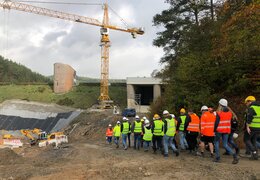
#count%
of all dit graduates
will find a job
within 2 months

shape your environment
#climateprotection #regenerativeenergies #cleanwater #sustainableconstruction #intelligentbuildingtechnology #energysaving #thermalprotection
#wastewatertreatment #sustainability #ecologicalconstruction #energyefficiency #conservationofresources #environmentalanalysis #natureconservation #environmentalprotection
#oldloads #thermodynamics #surveying #projectmanagement #environmentallaw #buildingtechnology #watermanagement #worksafety
We all agree that living in a world of concrete without consideration for the environment is unsustainable. These concrete jungles consume vast resources and struggle under extreme weather conditions like heavy rainfall.
How do we build climate-friendly structures? What defines an energy-efficient building? Which materials are sustainable, and how can we enhance recycling processes? How do we ensure that building projects are environmentally friendly? What regulations and standards are critical? Addressing the myriad challenges of sustainable construction requires a multi-faceted approach.
As an environmental engineer, your role is pivotal. With a solid foundation in natural and engineering sciences, civil engineering, building technology, project management, and legal frameworks, you are equipped to offer comprehensive consultations to clients, investors, and architects. You can lead projects from conception to completion, advocate for renewable energy use, investigate sustainable production of building materials, and analyze and decontaminate water, wastewater, soil, and building materials.
Are you ready to innovate in sustainability? Take a big step into the future with a practical degree programme in Environmental Engineering at DIT and help protect people, nature and the climate every day.
fact sheet environmental engineering
Degree: Bachelor of Engineering (B.Eng.)
Duration : 7 semesters (3.5 years)
ECTS points: 210
Start: October (winter semester)
Location : Deggendorf
Taught in: German
Application period: 15 April - 15 July
Admission requirements:
- General German university entrance qualification, or please check your eligibilty at the DAAD if you own an international qualification
- Language requirements
Prerequisites: sufficient knowledge of basic scientific subjects is beneficial
Fees:
- €72 student union fee per semester
- * International applicants and students
Dual study programme: The Environmental Engineering degree programme can also be studied in cooperation with companies. Information for prospective students and companies on the dual study programme in Environmental Engineering can be found here: Dual study programme UIW. You can find all information about the dual study programme in general on the dual study programme page.
Download: Study Programme Flyer
Rankings / Bewertungen:
CHE ranking 2019/20: Leading position in in Civil and Environmental Engineering


Enquiries:
- Course enquiries: bma-info@th-deg.de
- General information about studying at DIT: Study orientation
- Find out more about the degree programme on 3 July at our Online information evening (in German): The Faculty of Civil and Environmental Engineering introduces itself
Start of studies before October 2022: Information on the course of studies and the contents can be found under Module Handbook and Study and Exam Regulations.
career prospects
Climate protection is everywhere and is becoming increasingly important. The profession of environmental engineer could not be more in vogue. This is because the topics of sustainable construction, energy-efficient construction and renewable energies are of great importance for our world of tomorrow.
As an environmental engineer, you will combine sound expertise in engineering and natural sciences with extensive knowledge of the construction industry and important project management skills. In your day-to-day work, you will often find yourself working in interdisciplinary teams. As the link between civil engineers, architects, investors, authorities and planning offices, you will work hand in hand with them to shape our future.
With your Bachelor's degree in Environmental Engineering, you can work in a wide variety of fields:
- Energy-efficient planning and construction, energy consulting
- Project management and development
- Sustainable construction
- Recycling, utilisation and evaluation of materials
- Ecological water management
- Renewable energies
- Building technology
- Process engineering
- Geotechnics and surveying
- Occupational safety
- Environmental analysis
- Research and development
- and much more.
Alumni Review
Quirin Pietta
2014 | Ressourcen- und Umweltmanagement (heute: Umweltingenieurwesen)
Quirin Pietta describes his time studying in Deggendorf as a very formative period in his life. From today's perspective, he would choose the degree programme again if he were in that situation again.
Career Development
After successfully completing my studies in Resource and Environmental Management, I started as a project manager for floodlight masts at Europoles in Neumarkt, Upper Palatinate. It was a very civil-engineering job in which I was able to learn a lot about the exciting construction industry, such as calculations of material and personnel costs and project management. After three years at Europoles, I decided to switch to the mechanical engineering sector, and since 2017 I have been working as Regional Sales Manager in Export at DEPRAG SCHULZ GMBH u. CO. in Amberg. Here I am responsible for looking after subsidiaries or exclusive partners abroad with regard to our product portfolio in screwdriving and feeding technology and automation solutions. In addition, I have also been Managing Director of our Swedish subsidiary Deprag Scandinavia AB since 2021.
Reminiscing allowed: remember your student days
My student days in Deggendorf were a very formative period of my life. The small campus, the manageable hard core of fellow students in the course, allowed for a very efficient and, for me, very pleasant RUM study. Afterwards, I came into contact with all the subjects in my professional and private life: whether it was the basic mathematical training at engineering level to prepare demanding calculations, traffic management for construction site facilities at Europoles or contract law to survive in tough industries such as construction or mechanical engineering.
What advice would you give to today's students?
RUM education at DIT is broad and it's really about training engineering skills. I myself never worked in the environmental field after graduating, it just didn't work out, but many of my fellow students are, for example, project managers for wind turbines, work in municipalities in water supply and/or disposal or are in research. It is a degree programme that I would take again today, supplemented by a few modules from mechanical engineering, because my interest and professional career developed in this direction. All options are open to you, use the tutorials offered at the TH and attend as many lectures as possible. Talk to professors about possible practical semesters or Bachelor's thesis tips. They always had an open ear and useful tips for me.
Structure of the course
The Bachelor's degree programme in Environmental Engineering is designed as a full-time course and comprises seven semesters.
Basic maths and science subjects such as mathematics, building physics, chemistry and engineering mechanics form the foundation. Here you have the opportunity to take part in guided study groups with students from higher semesters, support courses or tutorials. This is followed by modules such as Renewable Energies, Sustainable Construction, Energy-efficient Planning and Construction, Process Engineering and Environmental Analysis and Law. After an internship, you choose a project study programme for the 6th and 7th semesters, specialising in project management or environment and sustainability. You can specialise further by choosing additional subjects such as Integral Planning, Pollutants, Negotiation Techniques or Contaminated Sites and Disposal. Build your very own vision of your career as an environmental engineer.
The Faculty of Civil and Environmental Engineering places particular emphasis on practice-based teaching. In addition to laboratory internships and practice-based group work, excursions to companies and construction sites as well as guest lectures by renowned industry experts are part of the programme. Get an insight into the degree programme here: Projects & excursions from the Environmental Engineering degree programme
Want even more practical relevance? You also have the option of completing a dual study programme in Environmental Engineering.
subject overview
The basic subjects in the first two semesters are mainly taken together with students on the Construction Management and Civil Engineering degree programmes. Specialisation in civil engineering, environmental engineering or construction management takes place in the higher semesters. This also means that students who are considering changing their degree programme within the faculty after two or three semesters can have many of the subjects they have already completed credited and therefore lose very little time.
Below you will find an overview of the courses, SWS (semester hours per week) and ECTS (European Credit Transfer and Accumulation System) in the Bachelor's degree programme in Environmental Engineering.
Programme content valid from WS 2022/23
| 1. Semester | SWS | ECTS |
| Chemistry | 4 | 5 |
| Basics in Engineering Mechanics | 4 | 4 |
| Basics in Hydromechanics | 2 | 3 |
| Desc. Geometry and Freehand Drawing | 2 | 2,5 |
| Structural Drawing and CAD | 2 | 2,5 |
| Construction Management 1 | 4 | 5 |
| Mathematics 1.1 | 4 | 4 |
| Materials 1 for Environmental Engineers | 2 | 2 |
| Structural Design 1 | 2 | 2 |
| 2. Semester | SWS | ECTS |
| Mathematics 1.2 | 2 | 3 |
| Materials 2 for Environmental Engineers | 3 | 3 |
| Structural Design 2 | 4 | 4 |
| Urban Land Use Planning | 2 | 2 |
| Building Physics 1 | 5 | 6 |
| Thermodynamics 1 | 4 | 5 |
| Regenerative Energies 1.1 | 3 | 4 |
| Computer Science | 2 | 2 |
| 3. Semester | SWS | ECTS |
| Thermodynamics 2 | 4 | 3 |
| Regenerative Energies 1.2 | 2 | 2 |
| Applied Programming | 2 | 3 |
| Heat Transfer | 4 | 5 |
| Mathematics 2 | 4 | 5 |
| Transport Engineering | 4 | 5 |
| Process Engineering | 4 | 5 |
| Mapping 1 | 2 | 2 |
| 4. Semester | SWS | ECTS |
| Mapping 2 | 3 | 3 |
| Engineering Analysis and Modelling | 4 | 5 |
| Building Technology 1.1 | 4 | 4 |
| Building Technology 1.2 | 2 | 3 |
| Geotechnics | 4 | 5 |
| CAE-GIS | 2 | 2 |
| Chemistry Internship (Laboratory Internship) | 2 | 2 |
| Geotechnical Engineering Internship (Laboratory Internship) | 1 | 1 |
| Basics in Sustainability (vhb Course) | 4 | 5 |
| 5. Semester / Praxismodul | SWS | ECTS |
| Internship (20 Weeks) | 0 | 25 |
| Internship accompanying course, PLV | 4 | 5 |
| 6. Semester | SWS | ECTS |
| Environmental Law | 2 | 2 |
| Environmental Analysis | 4 | 4 |
| Law | 4 | 4 |
| Economics Analysis (Investment and Financing) | 2 | 2 |
| Green Building | 4 | 4 |
| Energy-efficient Buildings | 2 | 2 |
| Water Management 1 | 6 | 6 |
| Possible specialisations (project studies at choice) | ||
| Project Management 1 | 5 | 6 |
| Environment and Sustainability 1 | 5 | 6 |
| 7. Semester | SWS | ECTS |
| Water Management 2 | 4 | 5 |
| Possible specialisations (project studies at choice) | ||
| Project Management 2 | 5 | 6 |
| Environment and Sustainability 2 | 5 | 6 |
| FWP Environmental Engineering | 4 | 5 |
| Construction Management 2 | 4 | 5 |
| Bachelor module (Bachelor Thesis & Seminar) | 10 | 10 |








